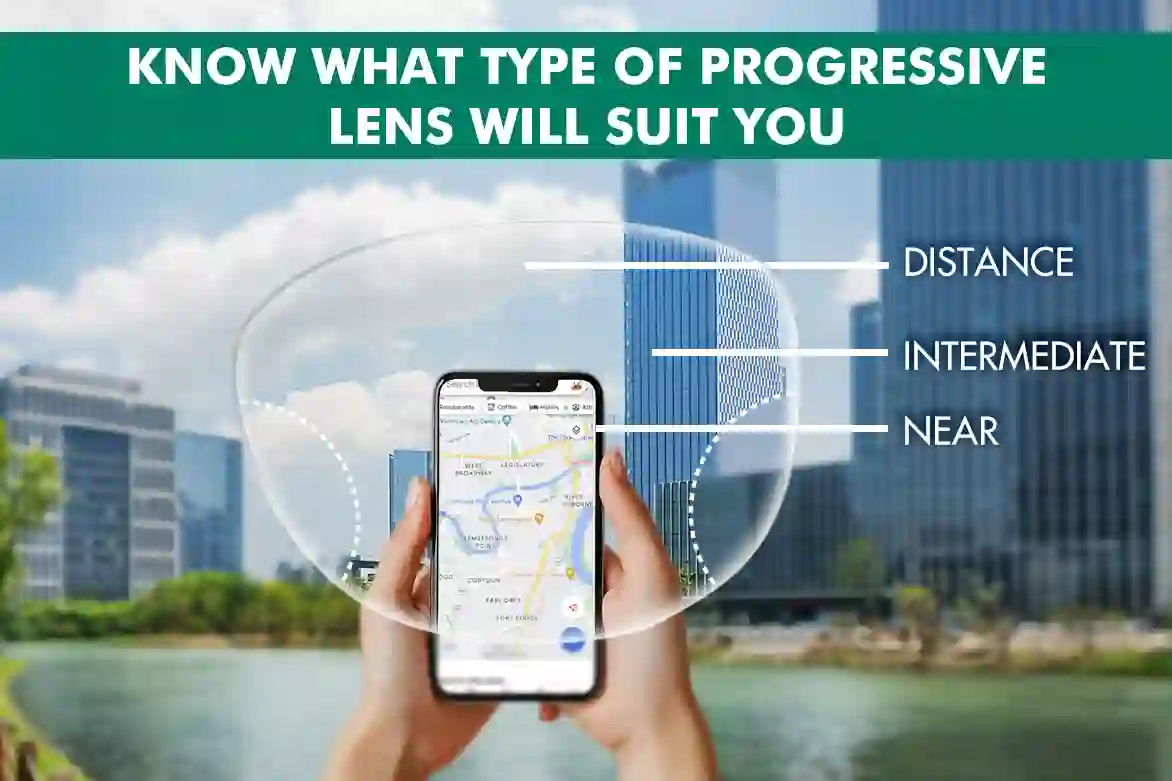Progressive lenses are an innovative solution for individuals with presbyopia, offering seamless vision correction for near, intermediate, and distance viewing. However, with so many types available, selecting the right progressive lens depends on individual vision needs, lifestyle, and preferences. Below, we break down the types of progressive lenses and guide you in determining which one suits you best.
Also Read: What is Progressive Lens & It’s Cost?
Types of Progressive Lenses
Choosing the right type of progressive lens involves understanding the specific features and benefits of each option. Here’s a detailed look at the most common types:
Standard Progressive Lenses
Standard progressive lenses are the most basic type and provide a balanced design for everyday use. They work well for most people, offering smooth transitions between near, intermediate, and far distances. These lenses are a cost-effective option for those new to progressive lenses.
Who Should Choose This?
- Individuals with general vision correction needs.
- People who do not require specialised lenses for specific activities.
Short-Corridor Progressive Lenses
Designed for smaller frames, short-corridor lenses maintain the functionality of progressive lenses, meaning that while accommodating modern, compact frame styles, they also ensure a seamless viewing experience without the need for larger, traditional frames.
Who Should Choose This?
- Those who prefer fashionable or smaller eyeglass frames.
- Individuals looking for style without compromising functionality.
Premium Progressive Lenses
Premium lenses are highly customisable and tailored to individual prescriptions, frame choices, and lifestyles. These lenses minimise peripheral distortion, offering a wider, clearer field of vision and a smoother transition between viewing zones.
Who Should Choose This?
- People seeking maximum comfort and clarity.
- Those willing to invest in a personalised solution for optimal vision.
Computer Progressive Lenses
The computer progressive lens design is for individuals who spend long hours in front of screens. They enhance the intermediate zone, reducing strain and improving focus on digital devices while still allowing for limited near and distance vision.
Who Should Choose This?
- Office workers or individuals with prolonged computer use.
- People experiencing digital eye strain or fatigue.
Outdoor Progressive Lenses
These lenses cater to outdoor enthusiasts and often include additional features like photochromic (light-adaptive) technology or polarised coatings. They enhance vision clarity in bright sunlight and provide UV protection.
Who Should Choose This?
- Individuals who spend significant time outdoors or enjoy activities like hiking or driving in bright conditions.
- Those looking for both vision correction and eye protection from UV rays.
Occupational Progressive Lenses
Occupational lenses are designed for specific tasks or professions that require enhanced focus at particular distances. They can prioritise near or intermediate zones depending on the individual’s work requirements.
Who Should Choose This?
- Professionals with unique vision needs like mechanics, chefs, or tailors.
- People who want task-specific clarity without compromising versatility.
No matter what type of progressive lens you choose, it takes some time to get used to them. We have a few tips for you to ease you into it.
Tips for Adjusting to Progressive Lenses
Adapting to progressive lenses can take some time if you’re new to progressive lenses. Here are a few essential tips to make the transition smoother and ensure you get the most out of your new eyewear:
Ensure Proper Fitting
A precise fit is critical for how progressive lenses work. Your optometrist will ensure the lenses are perfectly aligned with your eyes for maximum comfort and clarity. Poorly fitted lenses can make it harder for your eyes to adjust, leading to discomfort or distorted vision.
Allow Time for Adjustment
It’s normal for your eyes to take a couple of weeks to adapt to any type of progressive lens; for some, it might take a little over a month. Be patient during this period. If you’re still struggling to adjust after several weeks, consult your optometrist for advice or adjustments.
Understand Their Purpose
Knowing how progressive lenses work and what they’re designed for can help you use them more effectively. Talk to your eye doctor to better understand the benefits of your lenses and how they address your vision needs.
Wear Them Consistently
Wear your progressive lenses as often as possible to speed up the adjustment process. Avoid switching back to your old glasses, even if they initially feel more comfortable. Sticking with your new lenses will help your eyes adapt quickly and make the transition seamless.
By following these tips and working closely with your optometrist, you’ll be able to enjoy the full benefits of progressive lenses in no time!
Consult an Eye Specialist
Choosing the right progressive lens requires professional guidance. An eye specialist evaluates your prescription, lifestyle, and preferences to recommend the most suitable lens type.
Planet LASIK’s experts are committed to helping you find the perfect progressive lens for your unique needs.
Ready to explore your vision correction options?
Book your Appointment with experts from Planet Lasik.
Frequently Asked Questions (FAQs)
A progressive lens is a multifocal lens that provides a smooth transition between prescriptions for near, intermediate, and distance vision, eliminating the need for multiple pairs of glasses.
Progressive lenses are divided into three zones: the top for distance vision, the middle for intermediate tasks like computer work, and the bottom for close-up activities like reading. However, there is no clear line demarcating these zones on the lens. The seamless design allows smooth transitions between these zones.
The best progressive lens depends on your needs. Standard lenses suit general use, while premium lenses offer customisation and wider vision fields. Computer and outdoor progressive lenses cater to specific activities. It’s best to consult your optometrist before deciding what’s best for you.
More expensive progressive lenses often feature advanced designs, better customisation, and reduced peripheral distortion, providing enhanced comfort and visual clarity. However, standard lenses may suffice for basic vision needs.
Yes, progressive lenses are an excellent solution for presbyopia, offering convenience, functionality, and aesthetic appeal by combining multiple prescriptions in a single lens without any visible lines.

